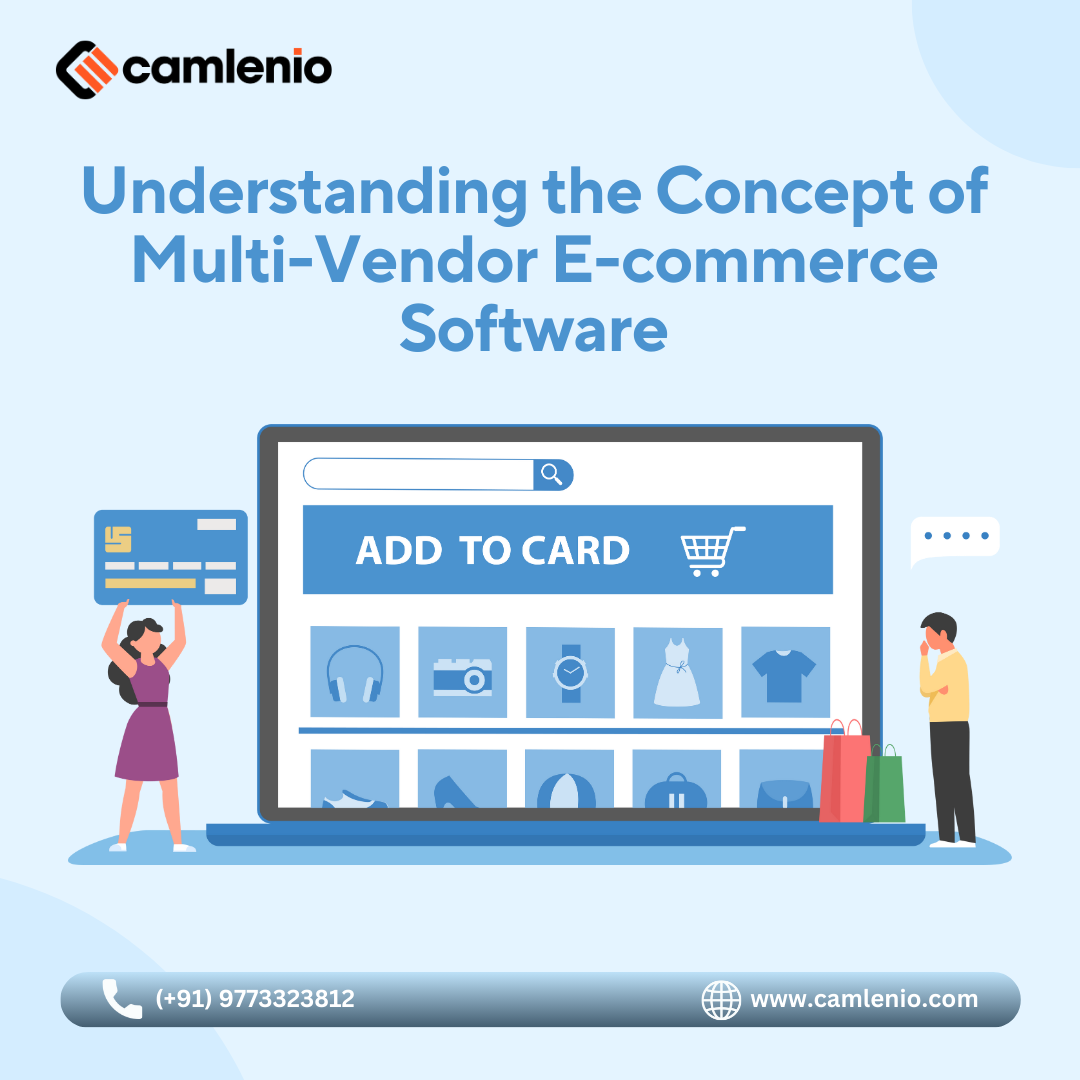E-commerce software is a platform or application that enables businesses to sell products or services online. It provides a range of features to facilitate online transactions, manage inventory, process payments, and handle other aspects of running an online store. E-commerce software can vary in complexity and functionality, from simple platforms for small businesses to comprehensive solutions for large enterprises. Examples of e-commerce software include Shopify, WooCommerce, Magento, and BigCommerce.
There are two main types of E-commerce software: single vendor and multi-vendor.
Single Vendor E-commerce Software: This type of software is designed for businesses that sell their products or services directly to customers. It allows a single seller to manage their online store, list products, process payments, and handle shipping. Examples of single vendor e-commerce software include Shopify, WooCommerce, and Magento (with the right configuration).
Multi-Vendor E-commerce Software: This type of software is designed for businesses that operate as a marketplace, where multiple vendors can sell their products or services on the same platform. It allows each vendor to have their own storefront within the marketplace, manage their products, prices, and orders. The marketplace owner typically manages the overall platform, including payments and customer support. Examples of multi-vendor e-commerce software include Magento (with the Marketplace extension), CS-Cart, and Dokan.
Read More : https://camlenio.com/blogs/travel-booking-software/
Explore the key e-commerce software features that every online store needs.
- User-friendly Interface: A clean and intuitive interface is essential for providing a seamless shopping experience. Ensure that your e-commerce software offers easy navigation, clear product categorization, and a responsive design for mobile devices.
- Product Management: Efficient product management features are crucial for adding, editing, and organizing products. Look for software that allows you to easily upload product images, descriptions, prices, and inventory levels.
- Inventory Management: Effective inventory management features help you keep track of stock levels, set up alerts for low inventory, and manage product variants such as sizes and colors.
- Order Management: Streamline your order processing with features like order tracking, order status updates, and automated order confirmation emails to keep customers informed about their purchases.
- Payment Gateways: Offer a variety of secure payment options to cater to different customer preferences. Look for e-commerce software that integrates with popular payment gateways like PayPal, Stripe, and Square.
- Shipping Options: Provide flexible shipping options such as flat-rate shipping, free shipping, and real-time carrier rates. Your e-commerce software should also support order fulfillment and tracking.
- SEO Tools: Optimize your online store for search engines with built-in SEO tools that help you improve your website’s visibility and ranking in search engine results pages (SERPs).
- Analytics and Reporting: Monitor your store’s performance with detailed analytics and reporting tools. Track key metrics like sales, traffic sources, and customer behavior to make informed business decisions.
- Customer Relationship Management (CRM): Build and maintain relationships with your customers through CRM features that allow you to track customer interactions, manage customer data, and send targeted marketing campaigns.
- Security Features: Protect your store and customer data with robust security features such as SSL encryption, PCI compliance, and fraud detection tools.
- Mobile Commerce: Ensure that your e-commerce software is optimized for mobile devices to cater to the growing number of customers shopping on smartphones and tablets.
- Integration Capabilities: Choose e-commerce software that integrates seamlessly with other tools and platforms, such as email marketing software, accounting software, and social media platforms.
- Customer Support: Provide excellent customer support with features like live chat, email support, and a comprehensive knowledge base to help customers find answers to their questions.
- Multi-language and Multi-currency Support: Reach a global audience by offering support for multiple languages and currencies, allowing customers to shop in their preferred language and currency.
- Social Media Integration: Leverage the power of social media by integrating social media sharing buttons, customer reviews, and social login options to encourage social engagement and increase brand visibility.
In conclusion, the e-commerce software features mentioned above are essential for creating a successful online store. By investing in the right e-commerce software with these features, you can attract more customers, increase sales, and grow your business.


Hello to every one, the contents existing at this website are
really awesome for people knowledge, well,
keep up the good work fellows.
Thank you
I like the helpful info you provide in your articles. I will bookmark your blog and
check again here regularly. I’m quite sure I will learn lots
of new stuff right here! Best of luck for the next!
Thank You So Much
It’s very trouble-free to find out any topic on web as compared to books, as I found this post at this site.
Thank You
Great article! You’ve covered all the essential features an e-commerce platform should have. I especially appreciate the emphasis on user-friendly interfaces and robust security features. These are crucial for providing a seamless and safe shopping experience. The inclusion of multi-language and multi-currency support is also spot on for reaching a global audience. Thanks for the comprehensive guide